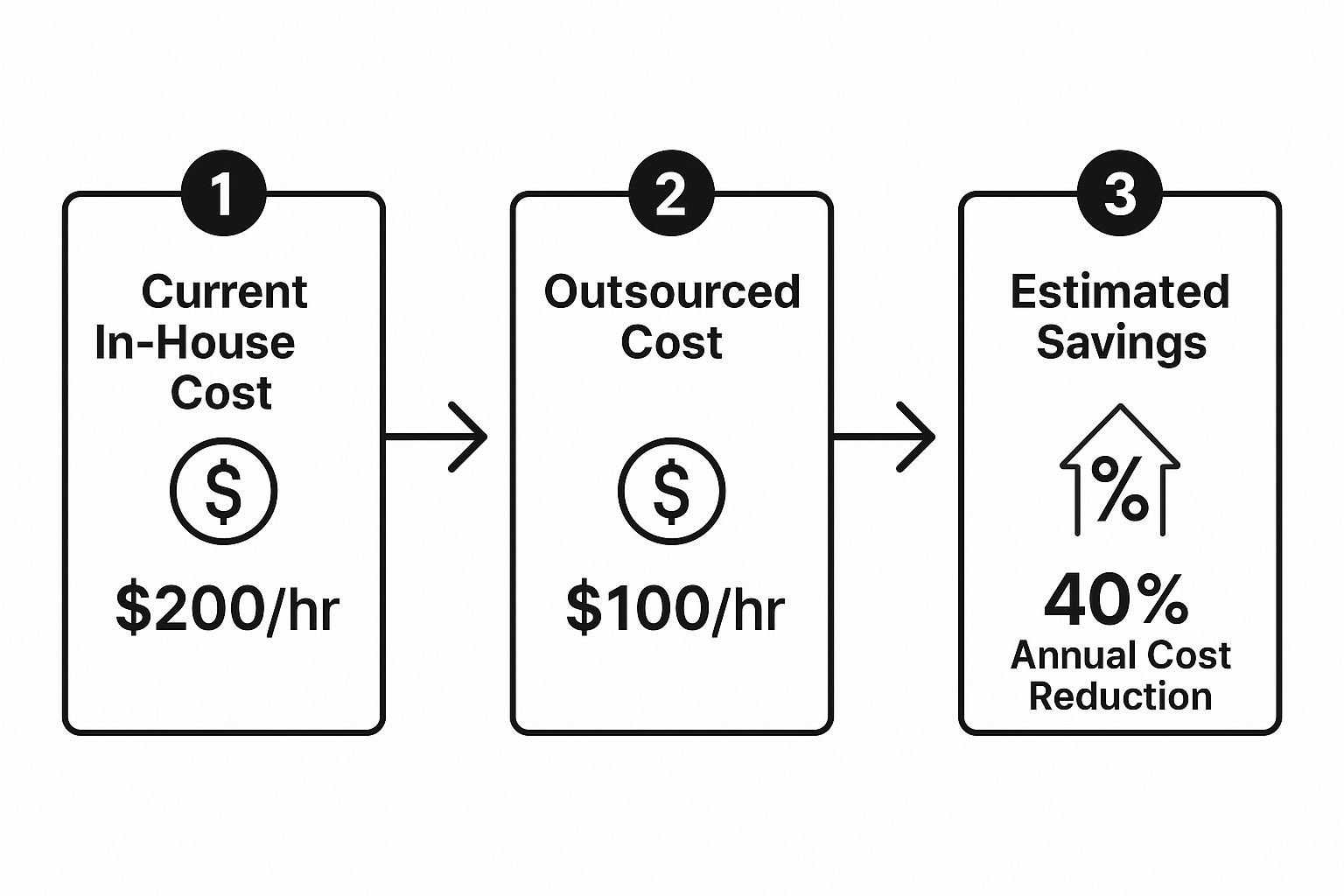
 22 minutes read
22 minutes read
So, you're drowning in legal fees. Welcome to the club. Outsourced legal services are the escape hatch for businesses that are sick of being bled dry by the billable hour. It’s a way to hand off the crucial but soul-crushing tasks—think contract reviews or compliance drudgery—to external pros. This gives you on-demand legal support without the gut-punch of a full-time hire or the eye-watering retainers from a big law firm.
Turns out there’s more than one way to get elite legal help without mortgaging your office ping-pong table.
Let’s be honest. That fancy law firm with the stunning city views? You're paying a premium for their rent, their espresso machine, and for work a top partner really doesn't need to be doing. It's a classic founder dilemma.
You absolutely need ironclad contracts and thorough due diligence, but your startup's budget wasn't meant to bankroll their annual ski trip. This isn't about being cheap with legal; it’s about being smart with your cash, especially when every dollar feels like your last. It's the painful reality of traditional legal costs—what I call The $500 Hello, where just opening an email feels like it's going on the clock.
For growing companies, the traditional legal model is broken. You're stuck with a bad choice: either roll the dice on a flimsy legal template you found online or pay a king's ransom for straightforward tasks. Suddenly, you're spending your afternoons sifting through boilerplate NDAs, and "legal review" has become your unofficial second job. Hope you enjoy it.
This isn't just an annoyance; it’s a direct hit to your runway. Every dollar you overspend on an overpriced junior associate reviewing a standard sales agreement is a dollar you can't put toward your product, marketing, or hiring that engineer you desperately need. It’s a quiet but deadly threat.

Think of outsourced legal services not as a cheap substitute, but as the specialized, on-demand legal department you didn't think you could afford. It's about paying for the exact expertise you need, right when you need it, without the mahogany desk overhead.
This is exactly where a strategic approach to outsourced legal services fits in. It’s not about ditching your trusted general counsel. It’s about being ruthless and delegating the high-volume, repetitive work that’s draining your team and your bank account.
This shift isn't just a fleeting trend; it’s a seismic change. The global Legal Process Outsourcing (LPO) market is already sitting at around USD 21.6 billion and is forecast to rocket to USD 157.9 billion by 2035. That's a massive 22.0% compound annual growth rate, driven by businesses just like yours demanding a better way. Discover more insights about the LPO market's growth.
By rethinking your legal workflow, you get real benefits:
Look, this is about changing your legal function from a reactive cost center into a proactive part of your business strategy. It’s time to stop trading your growth budget for legal bills.
So, what exactly are outsourced legal services? Let's cut the jargon. It's delegating specific legal tasks—often the mind-numbing, repetitive ones—to an expert external provider instead of bogging down your own people.
Think of it like building a house. You hire a master architect (your senior legal counsel) for the critical design and structural decisions. But are you going to pay that architect’s premium rate to lay bricks or install drywall? No. You bring in specialized, efficient crews for those jobs. Outsourced legal services are those specialized crews for your legal operations. Simple.

Let’s be perfectly clear: this isn’t about firing your trusted general counsel or that high-stakes litigator on speed dial. That would be insane. This is about building a smarter, more efficient hybrid legal model.
It’s about strategically offloading the high-volume, process-driven work that eats up your team's day and drains your budget. We're talking about the essential, everyday legal grind that keeps the business humming but doesn't need a senior partner's direct oversight.
What kind of work are we talking about?
This is about freeing up your most valuable legal minds to focus on strategy and high-impact advice, not administrative churn.
This isn't just a local trend; it's a global strategy driven by hard numbers. The worldwide market for Legal Process Outsourcing (LPO) has hit USD 15.3 billion. What’s truly telling is that offshore providers account for a whopping USD 12.15 billion of that.
That massive offshore share points to one undeniable truth: businesses are aggressively tapping into global talent hubs to gain a serious cost advantage. It’s not just about finding "cheaper" help; it's about accessing specialized expertise at a price point that makes perfect business sense. You can see the LPO market breakdown for yourself to understand the scale of this shift.

The goal is to build a hybrid model that blends strategic, high-level counsel with efficient, outsourced execution for the daily grind. It's a system where you pay the right price for the right task, every time.
Staring at your legal budget, the choice between sticking with a traditional in-house team and exploring outsourcing can feel overwhelming. Let’s break it down, head-to-head, focusing on the real-world pain points.
| Factor | Traditional In-House/Retainer | Outsourced Legal Services |
|---|---|---|
| Cost Structure | High fixed salaries, benefits, and overhead. You pay whether they're busy or bored. | Flexible, pay-as-you-go model. You only pay for the work you need, when you need it. |
| Scalability | Slow and expensive. Hiring takes months; downsizing is painful. | On-demand scalability. Instantly ramp up for a big project or scale down when it's quiet. |
| Expertise | Limited to the specific skills of your (very expensive) in-house team. | Access to a global pool of specialists for any niche area of law you can dream of. |
| Efficiency | Internal lawyers are often pulled into non-legal meetings and administrative BS. | Dedicated teams focused solely on executing legal processes with ruthless efficiency. |
| Turnaround Time | Can be glacial due to competing internal priorities and limited bandwidth. | Often faster turnaround thanks to specialized teams and 24/7 global operations. |
At the end of the day, embracing outsourced legal services is a pragmatic business decision. You aren’t cutting corners; you’re sharpening your operational edge. It’s the difference between a clunky, unpredictable cost center and a finely tuned engine for your business.
Deciding to outsource isn’t about waving a magic wand at every legal problem. Think of it less like a sledgehammer and more like a scalpel—a precision tool. Using it right is the difference between a strategic masterstroke and just creating a new set of headaches.
So, when is it actually time to pull the trigger?
Let's be clear: you’re not outsourcing your company’s bet-the-farm litigation or that tricky M&A negotiation. That’s what your top-tier counsel is for. But what about the other 90% of legal work? I'm talking about the high-volume, repetitive tasks that feel like death by a thousand papercuts.
That's the sweet spot.

Remember that exhilarating growth spurt last quarter? Fantastic for the bottom line. It also unleashed a tsunami of contracts. Now your team is drowning in a sea of NDAs, vendor agreements, and sales contracts, and every single one is a potential landmine.
This is a classic trigger. When the sheer volume of routine legal documents starts to slow down your actual business—delaying sales, holding up partnerships—that’s a massive red flag. Your expensive in-house lawyer shouldn't be spending their days redlining the same three clauses over and over.

You're not paying for a brilliant legal mind to be a glorified proofreader. You're paying for strategic guidance. Outsourcing the high-volume review work frees them up to actually provide it.
It's about letting your experts focus on high-value strategy while a specialized team handles the procedural grind with brutal efficiency.
Let's say you’re expanding into a new market. Now you’re tangled in a web of international compliance regulations you've never seen before. Or maybe you need to conduct a massive e-discovery for a lawsuit, a task that requires expensive, specialized software you'll only use this once.
Do you hire a full-time, six-figure expert for a one-off project? Of course not. That’s like buying a cruise ship for a weekend fishing trip.
This is a prime scenario for outsourcing. You tap into a provider’s deep bench of specialists and their expensive tech stack on a fractional basis. You get the A-team and the pro-level tools without having to sell the office furniture to pay for them.
This is especially critical for:
By bringing in outsourced teams for these specialized needs, you get all the experience without the long-term financial baggage.
Here’s a question for every CFO: how do you budget for legal spend when it swings wildly from one month to the next? A single lawsuit or one big deal can completely obliterate your forecast. This unpredictability is a killer.
Shifting routine tasks to an outsourced provider with a fixed-fee or project-based price introduces something rare in the legal world: predictability. You know exactly what your contract review process will cost each month, letting you build a stable, reliable budget. We offer more details on how outsourcing legal services can stabilize your costs in our comprehensive guide.
This isn’t just about saving money; it’s about gaining control. It turns a volatile line item into a manageable operational cost, which is music to any investor's ears. It’s a clear signal that you’re running a tight, disciplined ship.
Let's get this out of the way. Most people first look into outsourced legal services to save money. And yes, the savings are real—often huge. But if you stop there, you're missing the point.
The true, game-changing value of smart outsourcing isn't just trimming your budget. It's about transforming your legal function from a sluggish cost center into a strategic asset. We're talking about gaining speed, accessing deep expertise, and achieving an agility that a traditional law firm retainer can't touch.

In too many companies, the legal department is where momentum goes to die. A sales contract gets stuck in review for two weeks, a partnership agreement collects dust, and the whole business grinds to a halt. Sound familiar?
This is where the efficiency of outsourcing really shines. When you delegate high-volume work like contract reviews to a dedicated outsourced team, you aren't just cutting hourly rates. You're buying speed. Faster contract turnaround means closing deals quicker, onboarding clients sooner, and accelerating your entire revenue cycle.

The biggest benefit isn't what you save; it's what you gain. You gain velocity. You're no longer letting legal bottlenecks dictate the pace of your business.
This isn't just a hunch; the data backs it up. Companies that embrace advanced legal outsourcing services see tangible results. Studies show an average 30% improvement in case turnaround times and a corresponding 25% jump in client satisfaction scores. When you move faster, everyone wins.
Let's talk talent. As your business grows, you'll face a dizzying array of legal challenges. Suddenly you need to navigate GDPR compliance, protect complex IP, or manage employment contracts across multiple states.
What's the plan? Hiring a full-time expert for each of these niche areas is a financial fantasy for most businesses. This is where outsourcing becomes your secret weapon. It gives you on-demand access to an entire bench of specialists you could never justify hiring full-time.
Think about what this unlocks:
You're essentially getting the brainpower of a massive, multi-disciplinary law firm on a flexible, pay-as-you-go basis. Our guide to legal outsourcing services explores how to build this kind of on-demand legal team.
While cost reduction gets all the headlines, the real ROI comes from gains in speed, expertise, and focus. This table breaks down the hidden costs of the old way.
| Benefit Area | Traditional Model Pain Point | Outsourced Model Advantage |
|---|---|---|
| Speed & Efficiency | In-house teams become bottlenecks, slowing down sales cycles and business operations. | Dedicated teams turn around routine tasks (e.g., contracts) in hours, not weeks. |
| Access to Expertise | Hiring full-time specialists for niche issues (e.g., GDPR, IP) is prohibitively expensive. | Pay-as-you-go access to a deep bench of global legal experts for a fraction of the cost. |
| Risk Management | Generalist in-house counsel may lack the specific knowledge for complex compliance areas. | Reduces risk of fines and errors by using specialists who live and breathe specific regulations. |
| Scalability | Scaling up for a big project (like M&A due diligence) is slow and costly. | Instantly scale legal support up or down based on business demand, with no hiring overhead. |
| Technology Access | High cost of advanced legal tech (AI review tools, e-discovery) is a major barrier. | Leverage the provider's investment in cutting-edge technology without the capital expense. |
As you can see, the value extends far beyond the hourly rate. It's about building a more resilient, agile, and effective legal function that actively supports growth instead of hindering it.
Finally, let's talk about the most underrated benefit: freeing up your best people to do their best work.
Your general counsel and senior attorneys are your most expensive and strategic legal assets. So why are they spending half their day proofreading NDAs or chasing signatures? Every minute they spend on tedious, repetitive tasks is a minute they aren't spending on high-value initiatives that move the business forward.
Outsourcing the routine work isn't about replacing your key players; it's about empowering them. It elevates their role from process managers to genuine strategic advisors. They can finally focus on the complex negotiations, critical risk analysis, and big-picture planning that only they can do. That’s an ROI you can’t put a price on.
Alright, you’re sold. Now for the hard part: picking the right partner without getting fleeced. The market is buzzing with options, from massive global firms to tiny boutique agencies, and every one of them promises the moon.
So how do you tell the pros from the pretenders? This is my battle-tested guide to vetting a provider. This isn't about finding the cheapest option; it's about finding a genuine partner who gets your business, not just a faceless vendor. I’ve learned these lessons the hard way, so you don't have to.
Forget the sales pitch. Your job is to poke holes in their story. Don't be shy about it—this is your business on the line. I always start with a few pointed questions that cut right through the marketing fluff.
Here’s my go-to list:
You’ll get a quote that seems too good to be true. Spoiler alert: it is. Impossibly low rates are the siren song of the outsourcing world, luring you straight toward disaster.

A provider that competes solely on price is cutting corners somewhere. It could be in their hiring, their tech, their security, or all of the above. You don't want to find out which when a critical deadline is missed or your data gets breached.
Paying a bit more for a provider with a proven track record and robust systems isn't an expense—it's insurance. Remember, the goal is to reduce your risk, not create new problems to save a few bucks an hour. Speaking of rates, understanding the market helps; get a clearer picture of fair pricing by reviewing typical virtual paralegal rates before you start negotiating.
I don’t care how impressive their case studies are—I never sign a long-term contract without a trial run. A pilot project is the single best way to test the relationship in a low-risk environment.
Here’s how to structure it:
After the pilot, you’ll have your answer. Did they meet deadlines? Was communication smooth? Was the quality up to snuff? This small test will tell you everything you need to know before you commit. It’s the ultimate litmus test for any outsourced legal services provider.
So, you’ve picked a provider. You survived the demos, asked the hard questions, and you’re ready to pull the trigger. Fantastic. Now for the part where most companies drop the ball.
Don’t mess this up. A sloppy handover can torpedo all the potential benefits. This isn’t like hiring a freelancer you can just throw a task at over email. You’re onboarding a new department, and it needs a real plan.
This is about building a seamless extension of your own team. Here’s a pragmatic, no-fluff 90-day plan to get from kickoff to a smoothly running operation.
The first month is all about one thing: clarity. Ambiguity is the enemy of successful outsourcing. If you can’t define precisely what you want them to do and what "good" looks like, you’re setting them up to fail. And you’ll have no one to blame but yourself.
Get everyone in a room—your internal stakeholders and the provider’s key contacts—and hammer out the specifics.

The goal of this first month isn't just to delegate tasks; it's to eliminate guesswork. Your provider should know exactly what to do, how to do it, and who to ask if they get stuck, without ever having to assume.
Now it's time to connect the pipes. This is where you integrate the provider into your actual systems and workflows. The initial plan was a great start, but now it’s time to see how it holds up in the real world. Expect friction. The key is to find it and fix it, fast.
This phase is all about creating a tight feedback loop. Encourage your provider to point out inefficiencies in your existing processes. They have a fresh set of eyes and have likely seen what works (and what doesn't) at dozens of other companies. Their feedback is gold.
This is the phase where you start to lock in the cost-efficiency you were promised.

Visualizing the potential savings reinforces why this integration work is so critical.
By the end of month two, you should have a stable, functioning system. The final 30 days are about optimizing that system and looking for opportunities to expand the scope of your outsourced legal services.
The initial pilot project should be running smoothly. Now, ask yourself:
This is when you can start reaping the real rewards. With the foundational work done, you can begin offloading more complex tasks, confident that the process won’t break. You’ve moved from a tentative trial to a trusted partnership. Congrats, you’ve just built your on-demand legal department.
Alright, let's tackle the questions that are probably bouncing around in your head. When you're considering a big operational change like this, it's smart to be skeptical. Here are the straightforward answers you need.
This is the big one, isn't it? The fear of handing over the reins and losing oversight. But here's the reality: good outsourcing is about delegation, not abdication. You’re still in the driver's seat; you're just bringing in a specialist to handle the navigation.
You define the strategy, set the rules, and establish the quality standards. A solid provider then works within those exact guidelines. The key is establishing crystal-clear communication and detailed reporting from day one. Think of them as a specialized extension of your own team, not some black box you toss work into and hope for the best.
This is completely non-negotiable. Frankly, any provider who can’t give you a confident, detailed answer to this isn't worth your time.
Reputable outsourced legal services providers often have security protocols far more sophisticated than what a typical small or mid-sized company could build itself. When you're vetting partners, you need to dig deep on this.
Don't hold back. Ask to see their certifications (like ISO 27001), find out about their data encryption methods, and inquire about their employee background check process. A professional firm will expect these questions and have the documents ready to back them up.

A provider that gets defensive about security questions is a provider with something to hide. A true partner will be proud to show you how they protect your data.
Not even close. In fact, you could make a strong case that startups and mid-sized businesses have the most to gain. Huge corporations have the budget for massive in-house legal teams. You probably don't.
Outsourcing gives you access to a "fractional" legal department. It lets you bring in highly specialized skills for a specific project or scale your support during a busy period, all without the massive overhead of a full-time hire. It’s the ultimate flexible resource, letting you punch way above your weight class.
Ready to build a more agile, cost-effective legal team? HireParalegals gives you on-demand access to a network of over 10,000 vetted legal professionals. Find the exact expertise you need in as little as 24 hours and see how much you can save. Explore our talent pool today.